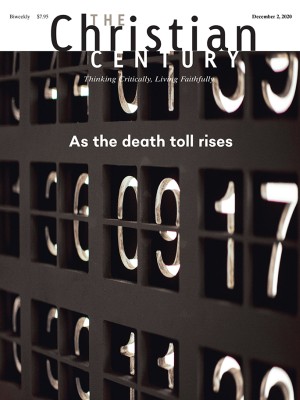December 20, Advent 4B (Luke 1:26–38)
We are still asking Mary's question: How will this be?
How will this be? I never planned to be postpartum in a pandemic. It was late January when I finally felt the waves of contractions pulsing through my abdomen. We had expected our daughter much sooner—due on Epiphany, my family was certain she would come by Christmas. But as the early days of 2020 stretched on, I watched my due date come and blandly go, before fading from my memory behind a scaffold of growing anxiety.
My baby would not budge. We joked then that the protruding kicks and stretches were actually her taking measurements and putting up curtains. We joke now that perhaps she sensed the year to come in ways we did not.
When she finally arrived I found myself immersed in a liminal space between newborn snuggles and newfound sadness, getting acquainted with this precious human who once called my body home, a place I no longer recognized. I measured her every exhale with awe and wonder while internally fighting the plunging sense of foreboding that the dance in her lungs might suddenly cease. Dusks gave way to dawns as I held tightly, fiercely to the miracle before me, as anxiety quietly gripped my dreams for my daughter, suffocating the inches of my peace. I did not know I would tremble at the world I brought her into, a world I wished to be her oyster, but in a country where her very embodiment, her Blackness, would be despised.
Read our latest issue or browse back issues.
Within six weeks, that world became cloistered and quarantined. How will this be?
I wondered how I was going to make it, as social distance and safety guidelines fed both my isolation and my fear. Returning to Mary’s words now—in medias res the wreckage of COVID-19, the thick of a tense election cycle (outcomes of which I do not know as I write this before the votes are counted), and the wake of a biological viral pandemic and a racial one—I find myself peering through the edges of Advent, braced for the start of a new liturgical year, with a deeper desperation for hope than I have had in recent years. I return to Mary’s words and remember, barely, the anticipation that swelled within me just a year ago. It seems so long ago. I return to Mary’s words and remember the anxieties I have not yet been able to cast off.
How will this be? Our readings so often focus on the mechanics. Mary’s question to Gabriel is the obvious one: Since she is a virgin, how exactly will these puzzle pieces of incarnation fit together inside of her womb? Just a few verses earlier, after receiving similar news of Elizabeth’s unexpected and miraculous pregnancy, Zechariah asks a parallel question. There in the temple, Gabriel takes umbrage at the inquiry as a sign of doubt and leaves Zechariah temporarily unable to speak. When it is Mary’s turn to receive good news, why is her question received so differently? I’ve always thought there must be something undetected in the text that changes Gabriel’s response. Perhaps it is her youth, or an uncaptured air of sincerity, or perhaps the knowingness of the ask—to give your flesh, to become someone new, to commit to a life that cannot answer the question of how exactly this will be.
How will this be? I am returned to this question that is so foreign yet so familiar, perhaps because it holds together the tensions of apprehension and trust, of fear and of courage, of the now that seems irrationally far from the not yet. I often find myself in tears—perhaps from the postpartum, from the pandemic, from the precarity, from the news cycle, from the protests, from the plague of isms, from the gulf of injustice that threatens to swallow me whole.
But every lament, every “How long, O Lord?” that leaves me raw and vulnerable, returns me to Mary. How? My ask of God resonates far more deeply in my soul. I am not asking God for a plan to work or a system to stick to. I am asking, again and again, to be met with the tenderness and tenacity to make it through whatever the day may bring. How, O God, is this going to go down, get accomplished, get fixed? How am I going to hang on, press forward, overcome? How am I going to make it, tired and discouraged, with an immediate horizon filled with far more fog than clarity and with little respite from a year of onslaught?
But the eyes of an infant remind me that both her existence and mine are acts of divine protest. We are signs of new life in a dying world, too. So I dare to ask again: How? Knowing I will not be silenced but heard. I ask because I believe that, like Mary, I will be answered, even if only with holy mystery. I ask because I realize that what I sometimes need is to simply know that the Holy Spirit is still at work—and to rest assured that even when I do not have answers, the presence of God will meet me. I ask because I believe that, like Mary, I will be reminded of God at work in community—that we will witness together even when we cannot gather in person.
How? It’s a question that will not get a roadmap or a timeline in response but is returned instead with a promise for the journey: no word from God will ever fail.






